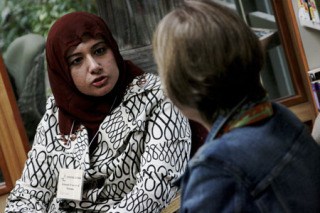Last October, the Bainbridge Public Library made a leap, becoming one of just two libraries in the nation to launch a Living Library.
“We weren’t quite sure how it would go over, and there was a lot of angst initially, over doing it,” event organizer Kathleen Thorne said. “I was really kind of amazed that the Bainbridge library was willing to take this on – it was fraught with peril, in a way. You just never know who you’re going to get.”
What they got was a qualitative success; Bainbridge branch manager Rebecca Judd said that since the October event, she’s gotten numerous requests for information from other libraries across the nation interested in putting on a Living Library themselves.
Bainbridge will hold its second one from 1-4 p.m. April 19 at the Bainbridge High School library.
In a Living Library, an exchange conceived by Danish antiviolence activist Ronni Abergel, “books” represent groups or individuals who have been the target of stereotyping or misunderstanding, or who might hold a controversial or little-known viewpoint.
Participants are invited to check out these books, in a manner of speaking, by holding a conversation with them.
October books included an African American father offering his perspective on Bainbridge living; an atheist; a Baha’i faith practitioner; a female cop; a Muslim woman; a Japanese American internment survivor; and a quadriplegic man.
New books on Sunday will include a deaf woman; a woman with epilepsy; an anarchist; an individual living with cancer; a libertarian; an “ordinary German” who lived in Nazi Germany; a male nurse; a Palestinian person; and a pair of nudists. (Clothed.)
Once participants “got it,” Thorne said of the October event, they really got it. This assuaged organizers’ initial concerns that the event would be tagged as a “quirkly lifestyle” or “oddball jobs” event.
Thorne herself talked to the atheist.
“For me, that was a really interesting conversation,” she said. “Not only did she talk about her experience, but…I had to kind of explain why I wasn’t an atheist. Which wasn’t all that easy. And it’s not something I typically get into conversations about.
“And I think most people came away with those kinds of experiences. It wasn’t that they got to poke into someone else’s life, necessarily, but they got a chance to examine themselves.”



